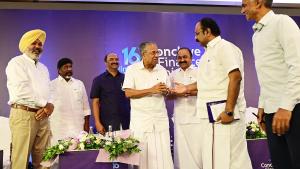Live Classes

At a meeting in Thiruvananthapuram last week, the Finance Ministers of five-Opposition-ruled States demanded a raise in the divisible pool of taxes from 41%- the Fifteenth Finance Commission's recommendation to a 50% apportionment, and a cap on the amount the Centre can collect as cesses and surcharges that usually appear as top-ups on invoices meant to fund specific central government projects and beyond the ambit of the devolution mechanism. The Karnataka Chief Minister Siddaramaiah has also reignited the debate by announcing his interest in convening a meeting of Chief Ministers of Opposition and BJP-ruled States to discuss the growing infringement on States' autonomy to collect taxes since the introduction of the GST framework and the penalising of States with better economic indices. The meeting assumes significance in the backdrop of the paltry sums allocated in the 2024-25 Union Budget for marquee plans such as Bengaluru's Suburban Rail Project, or the non-allocation of central funds for Kerala's Vizhinjam Port and the second phase of the Chennai Metro Rail project. The meeting must also be viewed in the backdrop of natural disasters striking various States across India such as the flooding in Tamil Nadu's southern delta regions last December, the recent heavy rains in western Gujarat, and the devastating landslide at Wayanad, Kerala. The Sixteenth Finance Commission's recommendations on tax devolution are expected by October 2025.
While the difference in the State Gross Domestic Product between States is rightly given the highest weightage of 45% by the Fifteenth Finance Commission in determining tax devolution as a measure to provide for the development of India's poorer regions, this has led to considerably reduced devolutions to top tax revenue contributing States such as Gujarat, Karnataka, Maharashtra and Tamil Nadu. As industrial and economic powerhouses, these States require tailor-made capital and social expenditures that could address particular developmental, climate and industrial needs of their varied regions. Apart from the restrictions on States by the GST framework on tax collections, low devolution has also meant that the governments of high-performing States are finding their hands tied at a crucial juncture in their economic and social trajectories. Moreover, neither the GST nor the Finance Commission have addressed contingency expenses, which are now relevant more than ever, to mitigate extreme weather events. In a large and complex country such as India, with vastly divergent social and economic indicators and an equally diverse spread of natural resources and vulnerabilities, it is time for an urgent intervention to amend the tax devolution frameworks that will lead to greater autonomy to the States. This would allow for a truly federal and a participatory governance model.
Constitution of the Sixteenth Finance Commission
What are the Major Terms of Reference for 16th Finance Commission?